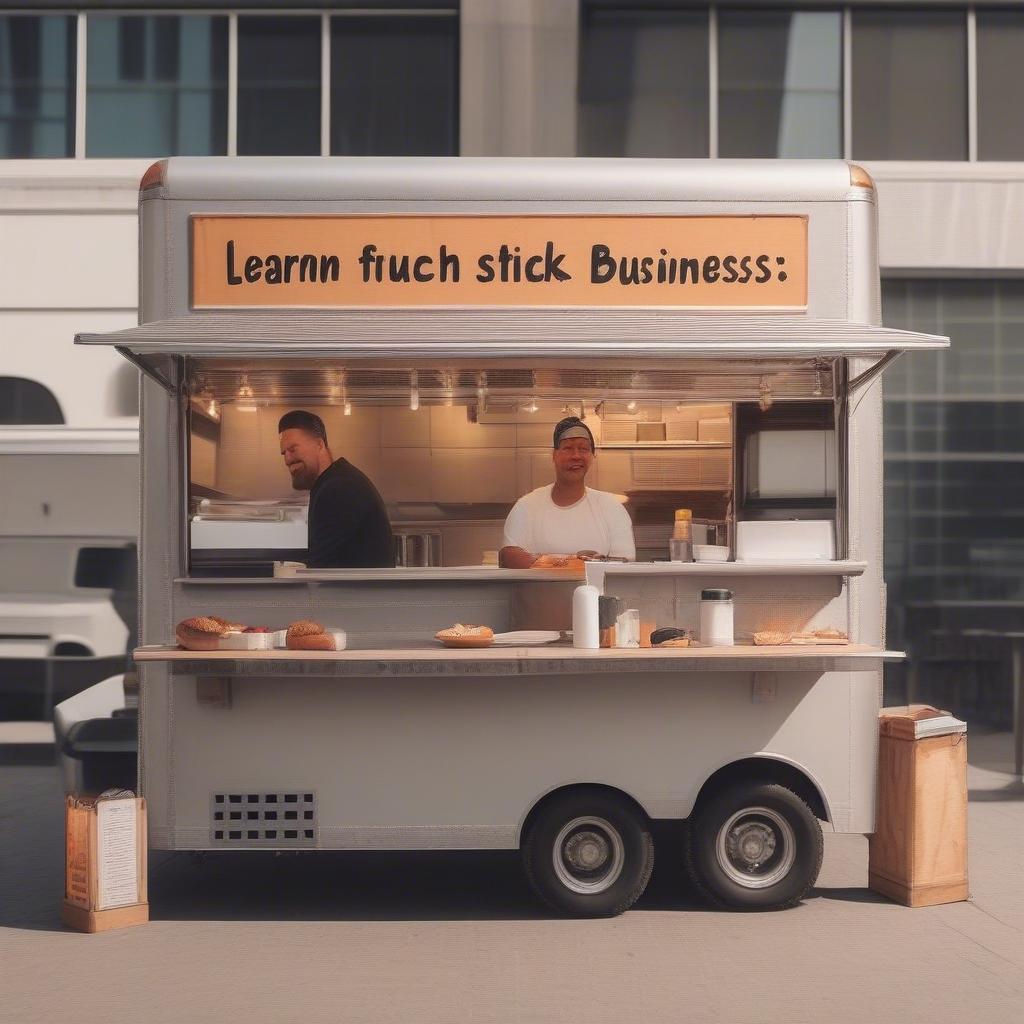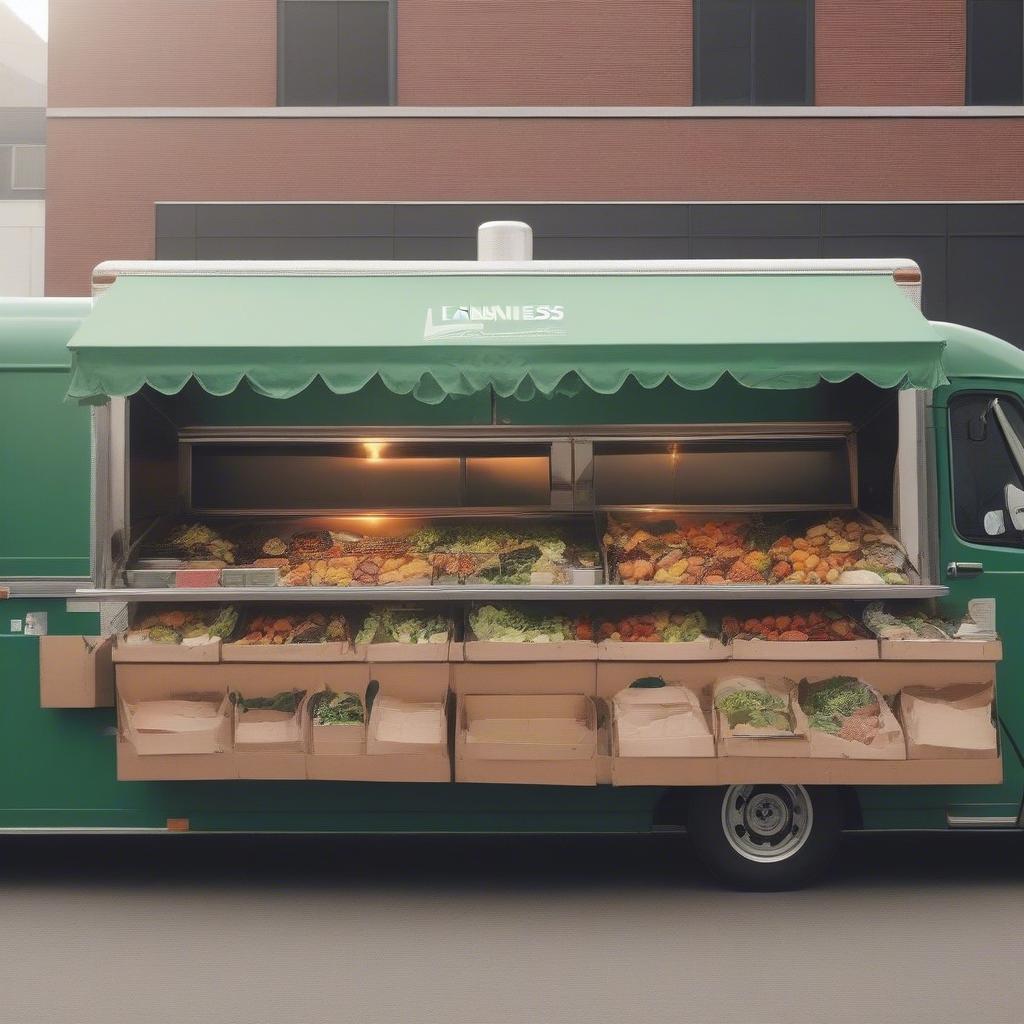
The aroma of sizzling onions, the rhythmic clang of spatulas, and the happy chatter of customers – this is just a sliver of the vibrant world a food truck owner inhabits. It’s a life that’s equal parts exhilarating and exhausting, demanding both culinary creativity and shrewd business acumen. Forget the romanticized vision of leisurely cooking; this is about grit, passion, and a whole lot of planning. Let’s peel back the curtain and explore the daily operations and what really goes on behind the scenes for a typical food truck owner.
Dawn Patrol: Setting the Stage for Success
The day doesn’t begin when the first customer arrives; it starts hours before, often when the sky is still a canvas of inky blue.
Pre-Sunrise Preparations
- Inventory Check and Grocery Run: The first task is a crucial one – a thorough inventory assessment. Did we run out of burger patties? Are the avocados perfectly ripe? A quick scan of the refrigerator and dry storage is essential. Often, this is followed by a swift trip to the local market or supplier to replenish any stock that’s running low. This is where knowing your consumption rates is key; you don’t want to be caught short during the lunch rush!
- Truck Inspection and Maintenance: Before hitting the road, the food truck itself needs a once-over. Oil levels, tire pressure, generator functionality, and ensuring all cooking equipment is in top shape – a checklist approach is the best way to avoid a breakdown mid-service. This preventative maintenance is critical; breakdowns mean lost revenue and frustrated customers.
- Food Prep: The Art of Mise en Place: With the truck ready to roll, it’s time for the magic to begin. Chopping vegetables, marinating meats, making sauces and dressings, – all these are part of the mise en place, French for “everything in its place.” Preparing these elements ahead of time streamlines service during peak hours, allowing for quicker and more consistent food delivery.
The Road to Location
- Navigating Permits and Regulations: Every city and town has its own set of rules for food trucks. Securing the necessary permits for your chosen location is non-negotiable, and sometimes the paperwork can be an obstacle. A food truck owner must be familiar with parking regulations, health codes, and any specific requirements for their area.
- Strategic Location Choice: Location is king. A successful food truck owner researches ideal locations, assessing foot traffic, competition, and target demographics. A bustling downtown area might be perfect for lunch, while a park or event could be the gold mine on weekends. It’s about finding the right spot that meets your unique offering and caters to your customers’ needs.
- Setting Up Shop: Once the perfect spot is secured, the final preparation includes deploying awnings, hooking up power, arranging menus, and ensuring everything is both visually appealing and functional. From chalkboards with daily specials to neatly placed napkins, every detail matters.
The Lunch Rush: A Symphony of Controlled Chaos
The mid-day hours are often the most demanding, a period of non-stop action that requires incredible focus and teamwork.
Taking Orders and Managing the Line
- Customer Service with a Smile: Even when dealing with long queues, a friendly demeanor is essential. A warm greeting and efficient service help keep customers happy and coming back. Remember, a smile goes a long way.
- Streamlined Ordering System: Whether it’s a digital point-of-sale (POS) system or a more traditional method, efficient order taking is crucial. A well-structured system reduces wait times and ensures accuracy. Consider implementing strategies like having a dedicated person taking orders while another prepares them.
- Managing Wait Times and Expectations: Transparency is key. Informing customers of estimated wait times manages expectations and can prevent frustration. Consider offering small incentives like complimentary water or a small discount for longer waits.
The Art of Food Preparation
- Consistent Quality Control: Even in the rush, maintaining food quality is paramount. Every burger should be cooked to perfection; every taco should have the right balance of fillings. Consistency keeps customers loyal. Implement recipe standards and regular checks to ensure consistency.
- Efficient Cooking Workflow: A well-organized cooking area minimizes errors and maximizes speed. Clearly defined stations for each part of the process – assembling, cooking, plating, etc – streamline the flow and keep things moving smoothly.
- Adapting to Customer Requests: A good food truck owner is adaptable. Being willing to adjust orders based on dietary needs or customer preferences demonstrates care and elevates the dining experience. However, it’s also important to set limits and stick to your core menu items.
Navigating Challenges
- Equipment Malfunctions: Even with thorough checks, things can sometimes go wrong. A generator can sputter out, a fryer can fail, and these sudden challenges require swift problem-solving and resourcefulness. Having backup equipment and a solid plan B is always advisable.
- Unexpected Weather: Rain, wind, or excessive heat can significantly impact sales. Being prepared for these events with appropriate coverings, portable fans, or a backup indoor location is essential. Weather can be an unpredictable foe, and a flexible approach is crucial.
- Dealing with Difficult Customers: Unfortunately, not every interaction is smooth. A food truck owner must be prepared to handle complaints professionally and with grace. It’s about finding a solution that satisfies the customer while upholding your business policies.
The Post-Lunch Slowdown: Time for Reflection and Replenishment
As the lunch rush subsides, it’s time to take a breath and prepare for the next wave of customers, whether it’s a late afternoon snack crowd or the dinner rush.
Cleaning and Stocking
- Maintaining a Hygienic Space: After the rush, a deep clean is essential. Wiping down surfaces, sanitizing equipment, and sweeping floors helps maintain food safety and a professional appearance. Maintaining a high hygiene standard is non-negotiable.
- Replenishing Supplies: The slower hours are ideal for replenishing items. Restocking napkins, condiments, drinks, and prepping for any dinner rush ahead ensures you’re ready when the crowds return. Staying proactive on inventory keeps operations smooth.
- Waste Management: Proper disposal of food waste and packaging is also critical. Following all city guidelines for waste removal protects the environment and ensures compliance with local regulations.
Financial Reconciliation
- Tallying Daily Sales: Keeping a close eye on the books is crucial for profitability. Counting cash, reconciling POS transactions, and calculating daily revenue provides insight into sales performance and identifies areas for improvement.
- Expense Tracking: In addition to tracking income, meticulous expense tracking is vital. From ingredient costs to permit fees to fuel, knowing where every penny goes helps ensure the business remains financially sustainable. Tools like spreadsheets or accounting software can make this task much easier.
- Identifying Sales Trends: Analyzing sales data over time reveals patterns, like your most popular dishes, peak sales hours, and opportunities for menu adjustments. This data is essential for strategic decision-making and optimizing your offerings.
The Evening Service: A Second Wind
Depending on the business model, the evening can be just as busy as lunchtime. This is where some food truck owners shine, focusing on the after-work crowd or evening events.
Adapting the Menu and Service
- Adjusting to the Evening Crowd: Depending on the target audience, evening menus and services might differ from daytime options. Offering more elaborate dishes, specialty drinks, or catering to a more relaxed atmosphere can entice the after-work crowd.
- Catering to Events and Special Occasions: Evening events, such as local fairs, festivals, and private gatherings, can be excellent revenue opportunities. Being prepared to handle large orders and coordinate catering services can be beneficial.
- Customer Engagement: The evening is often a more relaxed pace, providing opportunities for more interaction with customers, building rapport, and gathering feedback on the menu and service.
Wrapping Up
- Final Inventory Check and Stocking: At the end of the night, a final inventory check ensures you’re prepared for the next day. Ordering supplies and restocking for the next shift ensures a smooth start to your next operation day.
- Deep Cleaning and Maintenance: The last task of the day is a thorough cleaning of the entire truck. All cooking equipment must be properly cleaned and sanitized, and floors, walls, and other surfaces must be wiped down. This is an important procedure to keep the truck running smoothly and maintain high hygiene standards.
- Securing the Truck for the Night: Finally, securing the truck in a safe and permitted location for the night is essential. Make sure all utilities are turned off and the truck is locked and protected.
Behind the Scenes: The Non-Stop Work of a Food Truck Owner
The life of a food truck owner extends far beyond just cooking and serving. It also involves a multitude of other tasks.
Marketing and Social Media
- Building an Online Presence: In today’s digital world, an active social media presence is essential for a food truck owner. Posting engaging content, like daily specials, mouth-watering photos, and customer testimonials, attracts new customers and keeps regulars in the loop.
- Engaging with Customers Online: Responding to comments and messages promptly, and actively engaging with your audience on social media, builds community and strengthens customer loyalty.
- Exploring Local Marketing Opportunities: Connecting with local communities, collaborating with neighboring businesses, and participating in local events can boost brand awareness and draw in new customers.
Legal and Financial Responsibilities
- Navigating Permits and Insurance: Keeping abreast of all legal requirements, including maintaining all necessary permits and appropriate insurance policies, is a constant task. Staying in compliance with local health codes and regulations is an ongoing commitment.
- Managing Bookkeeping and Taxes: From balancing the books and managing taxes to staying financially organized, a food truck owner must be meticulous with their financial management. This includes tracking both expenses and revenue, and filing all taxes on time.
- Dealing with Supplier Relationships: A good relationship with suppliers is crucial for sourcing quality ingredients and ensuring on-time deliveries. Maintaining consistent contact with suppliers is a part of daily operations and helps avoid disruptions.
Menu Planning and Innovation
- Regularly Reviewing and Updating the Menu: To keep things fresh and exciting, a food truck owner regularly reviews their menu based on sales data, seasonal ingredients, and customer feedback. Menu innovation keeps loyal customers engaged.
- Experimenting with New Dishes and Flavors: A passion for culinary creativity is essential to keep the menu fresh and interesting. A food truck owner is constantly trying new recipes and flavor combinations to develop unique and exciting new menu offerings.
- Gathering Customer Feedback: Customer feedback is essential for determining what dishes are working and what should be changed or eliminated. Actively seeking and listening to customer feedback will ensure your menu is successful.
How Learn Business Supports Food Truck Owners
Running a successful food truck is a whirlwind of activity, and sometimes a little guidance can make all the difference. This is where Learn Business comes in. Learn Business supports businesses of all sizes and types, including food truck ventures, by offering a range of resources designed to help businesses succeed.
Learn Business Templates
- Business Plan Templates: A solid business plan is essential, but creating one from scratch can be daunting. Learn Business provides customizable business plan templates that guide you through all the necessary steps, from market research to financial projections.
- Financial Forecasting Templates: Managing finances can be tricky, and accurately predicting future revenue is critical for success. Learn Business offers templates that help you create comprehensive financial forecasts, track expenses, and monitor profitability.
- Marketing Plan Templates: In today’s competitive market, a solid marketing strategy is essential. Learn Business templates help you develop a strategic marketing plan, including target market analysis, campaign planning, and promotional tactics.
Expert Guidance and Resources
- Guides on Operations and Management: Learn Business provides in-depth guides on critical business operations, such as inventory management, staff training, and customer service techniques. These guides help you streamline your daily operations.
- Tips on legal and compliance: Navigating the legal landscape of owning a food truck can be complex. Learn Business offers resources on permits, licenses, insurance, and other compliance requirements to make sure your business is up to code.
- Strategies on Marketing and Growth: Learn Business provides tips on effective marketing strategies, social media engagement, and promotional tactics to help food trucks reach new customers and grow their brand.
By leveraging the resources and guidance from Learn Business, a food truck owner can streamline their operations, manage their finances effectively, and navigate the challenges of running their business successfully. Ultimately, these tools help food truck owners build thriving and profitable businesses.
Conclusion: The Rewarding Life of a Food Truck Owner
The life of a food truck owner is not for the faint of heart. It demands hard work, long hours, and a constant willingness to adapt. However, it is also an incredibly rewarding endeavor, filled with the satisfaction of creating something delicious, connecting with customers, and building a thriving business. From the early morning grocery runs to the late-night cleanups, every moment contributes to the unique and dynamic world of the food truck. A true understanding of the daily operations and what happens behind the scenes is crucial for success in this competitive industry. If you have the passion, the grit, and the drive, the food truck life might just be the perfect recipe for your personal and professional fulfillment.



Leave a Reply